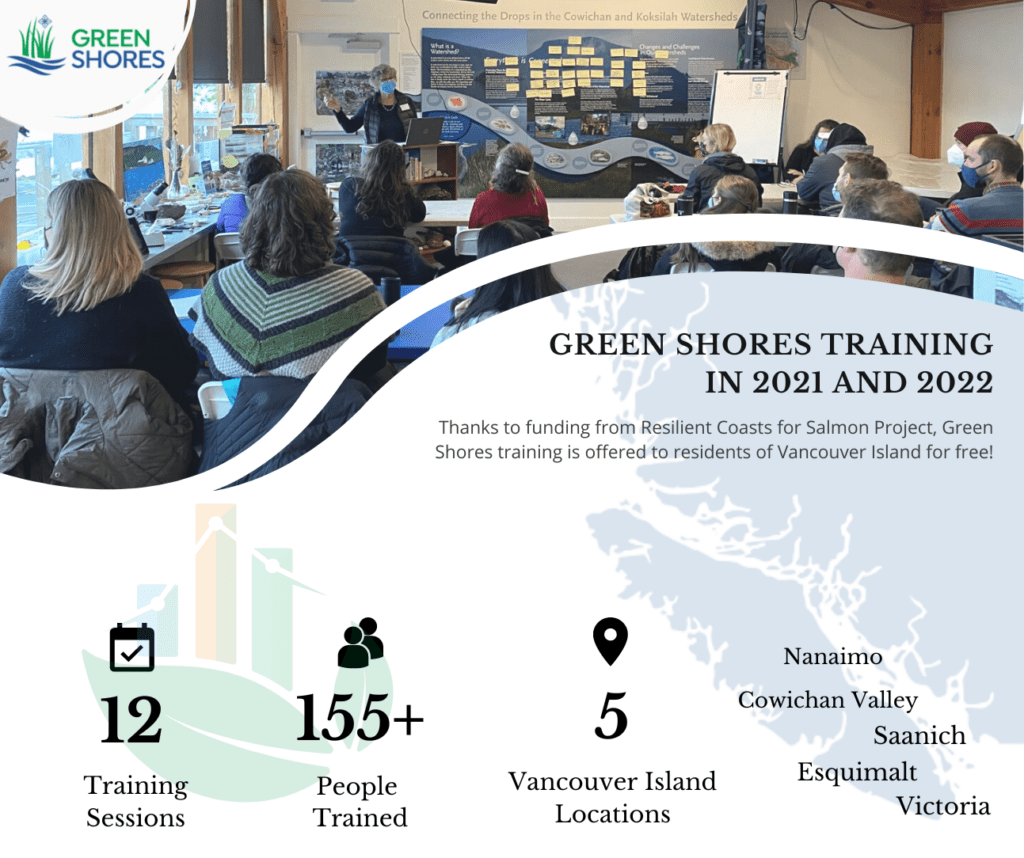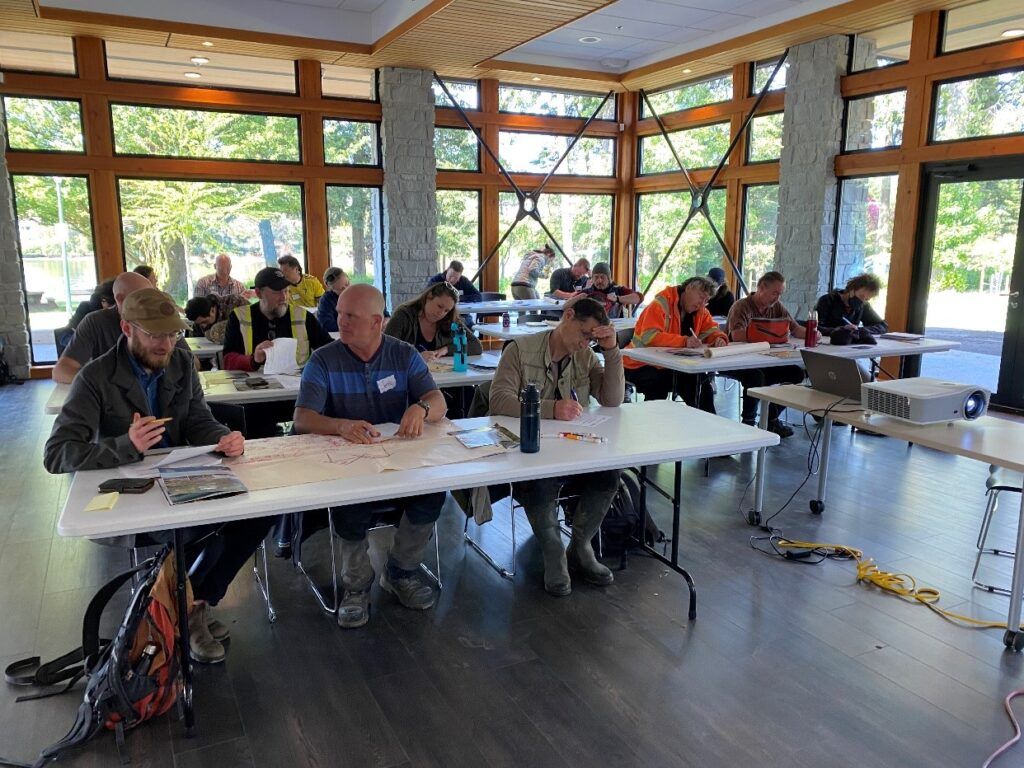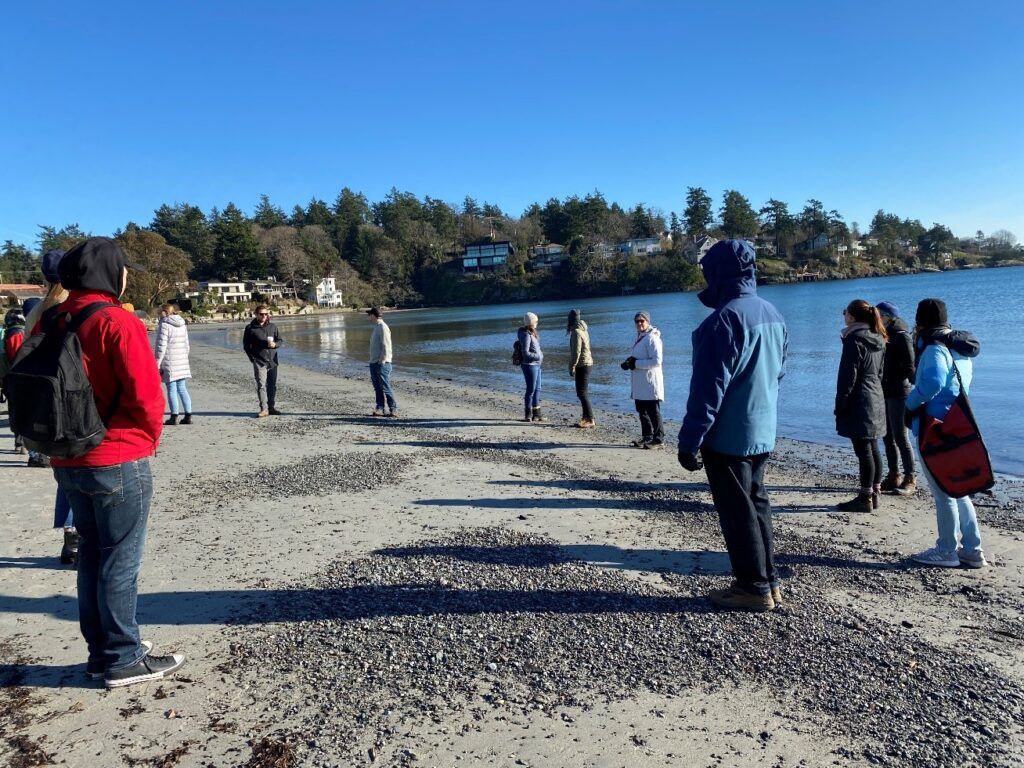One of the key objectives of the Resilient Coasts for Salmon Project is to build capacity among those that live and work on the shoreline. Green Shores training is being offered to meet that objective along the East Coast of Vancouver Island.

In Year One of the project (2021-2022), the first offerings were made available on southern Vancouver Island at class and field site locations, including the University of Victoria and shorelines around the Capital Regional District. Year Two (2022-2023) expanded offerings to the mid-Island, including Cowichan Bay and Nanaimo. Year Three and Four (2023 -2025) will offer courses in communities north of Nanaimo, and Year Five (2025-2026) will provide training opportunities for smaller communities along the coast.
This training (GS L1 and GS L2) is being offered free‑of‑charge through Resilient Coast for Salmon, and benefits include the opportunity to raise awareness about how nature-based solutions, such as those included in the Green Shores framework, can be an important part of mitigation and adaptation to climate change on shorelines. Learn more about building a Green Shores Community of Practice.
In British Columbia, the Stewardship Centre for BC (SCBC) is partnered with two post-secondary institutions: the University of Victoria Continuing Studies and the British Columbia Institute of Technology (BCIT), to deliver three levels of training.
Green Shores Level 1 (GS L1): This one-day course is for anyone interested in a comprehensive introduction to the Green Shores nature-based solution framework and the four foundational principles that benefit people and the environment. Information about the two Green Shores Credit and Ratings guides (Green Shores for Homes and Green Shores for Shoreline Development) is provided, along with an opportunity to apply learnings on-site at a shoreline field location.
Attendees may include Indigenous Peoples, local government staff and elected officials, stewardship groups, consultants and contractors, environmental students, homeowners, and project proponents. Registration for the in-person training is through the University of Victoria Continuing Studies Green Shores™ Training Program: Level 1 Workshop | Continuing Studies at UVic. Green Shores Level 1 is also offered as an online course through BCIT Green Shores Level 1 (RENR 1720) – BCIT.
Green Shores Level 2 (GS L2): This two-day course offers opportunities for in-depth application of the two Green Shores Credits and Ratings guides and to practice the design of restoration projects that use the Green Shores principles at multiple shoreline field sites. Attendees may include anyone who has attended Green Shores Level 1 and wants to develop a greater understanding of the Green Shores framework. The format is in-person, and registration is through the University of Victoria Continuing Studies Green Shores™ Training Program: Level 2 Workshop | Continuing Studies at UVic.
Note: Green Shores Level 1 is a prerequisite.
Green Shores Level 3 (GS L3): This course is intended for planning, design and construction professionals such as biologists, landscape architects, engineers, geoscientists, planners, contractors and others with expertise and experience in the application of Green Shores principles, who are interested in proving their proficiency. This course will not gauge experience and proficiency in a chosen profession. Rather, it will assess each attendee’s ability to apply the Green Shores Credits and Ratings systems within the context of a chosen profession through the creation of a Green Shores Professional Proficiency portfolio that shows familiarity and skill with the Green Shores program. Submission of this portfolio and successful completion of a technical exam will provide classification as a Green Shores Approved Professional.
Registration is through BCIT at Green Shores Level 3: Professional Proficiency (RENR 1740) – BCIT.
Note: Green Shores Levels 1 and 2 are prerequisites, and this course is available on a continuous enrollment basis.

Those interested in attending Green Shores training are recommended to contact the University of Victoria Continuing Studies (UVic) or BCIT through the links above. Alternatively, Green Shores training information is available on the our website: Building Capacity - Resilient Coasts for Salmon and the SCBC webpage Green Shores Training Overview. Information about upcoming courses is posted as it becomes available. Due to their popularity, it is recommended to register as early as possible. If the course is full, you will be added to a waitlist and notified if space or another course becomes available. To receive notification regarding UVic courses as soon as they become available, you can register your interest here: Sign in | Continuing Studies at UVic.
What do past Green Shores training attendees say?

“As a parks and recreation team member, I found the Green Shores Level 1 course has given me the theoretical and practical understanding about the importance of this planned shoreline restoration work. I am looking forward to participating in this Green Shores demonstration project in Esquimalt Gorge Park as well as communicating about it to the public who will want to understand what is being done, the impact to the park, and what the benefits are.” Robbie Young, Township of Esquimalt Parks and Recreation.
“The Green Shores Level 1 training workshop was an enjoyable mix of theoretical and hands-on learning. We had a diverse group including planners and environmental monitoring staff. We took away the importance of considering options outside of hard armouring when establishing shoreline protection. We hope that this information can be used and applied while considering coastal restoration projects on territory in the future.” Benjamin Fortini, Staff at Malahat Nation.
Curious to hear more feedback from Green Shores training attendees? Check out this article.
Upcoming Green Shores training will continue developing community capacity and awareness about how nature-based solutions can promote resiliency to climate change along the East coast of Vancouver Island. Increasing the number of shoreline practitioners with knowledge about the Green Shores framework will benefit everyone who wants to minimize the impacts of shoreline development.
Opportunities for engagement and collaboration between graduates are expected to increase as people subscribe to the RC4S newsletter, which connects organizations and community members throughout the region.
Stay tuned for future Green Shores training dates through the links provided above, or feel free to contact:
DG Blair SCBC Executive Director DG@stewardshipcentrebc.ca
Kyla Sheehan Resilient Coasts for Salmon Project Manager ksheehan@psf.ca
Photo Credits: Kelly Loch